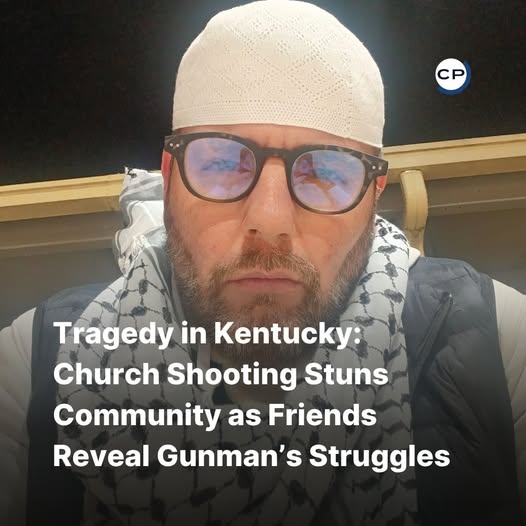In a quiet Kentucky town, a close-knit church community was shattered by an unthinkable tragedy that has left a deep scar on the hearts of its members and the surrounding region. During a routine Sunday service, peace was violently torn apart when a local rapper, described by friends and acquaintances as having “snapped,” opened fire inside the sanctuary. The horrific incident resulted in multiple fatalities and left many more wounded, both physically and emotionally. This devastating event has sent shockwaves far beyond the church walls, stirring urgent and painful conversations about mental health, gun safety, and the complicated relationship between personal suffering and public violence.
The church, a place traditionally seen as a refuge of peace, healing, and community, quickly became the scene of chaos and heartbreak. Witnesses recount the terrifying moments when gunshots echoed through the pews, turning a place of worship into a scene of horror. Families who had gathered in faith found themselves grappling with grief and disbelief, while first responders worked swiftly to tend to the injured and contain the aftermath of the violence.
Authorities revealed that the assailant was a young man known locally as a rapper with a promising artistic career but whose recent behavior had alarmed those close to him. Friends described him as a person struggling with intense personal issues and mental health challenges, someone who seemed to have “snapped” under the weight of unresolved pain. This heartbreaking portrait has added layers of complexity to the tragedy, highlighting the often unseen battles that individuals face behind closed doors, battles that, if left unaddressed, can erupt into public calamity.
The shooting has reignited the long-standing national debate over gun safety in the United States, spotlighting the ease with which firearms can fall into the hands of troubled individuals. Advocates for stricter gun control argue that stronger laws could prevent such senseless acts of violence, while opponents call for balanced approaches that respect constitutional rights yet prioritize public safety. The incident in Kentucky has become a painful reminder of the urgent need to reassess and reinforce the systems designed to protect communities from similar tragedies.
Equally significant is the renewed focus on mental health awareness and the vital importance of accessible, compassionate care. The rapper’s downward spiral underscores how mental illness and emotional distress, if untreated, can lead to catastrophic outcomes not only for the individual but also for those around them. Mental health professionals, community leaders, and advocacy groups have emphasized the necessity of early intervention, removing stigma, and creating supportive environments where people feel safe to seek help before crises emerge.
In the wake of the shooting, the Kentucky community has rallied together in mourning and solidarity. Vigils, memorial services, and counseling programs have been organized to support survivors, families of the deceased, and traumatized witnesses. Religious leaders have called for healing and forgiveness, while mental health experts stress the importance of trauma-informed care to help individuals and the community at large navigate the path toward recovery.
This tragic event serves as a sobering call to action for society at large. It demands a compassionate examination of how personal anguish intersects with broader social issues—how untreated mental illness, unchecked access to firearms, and the lack of supportive networks can converge with devastating consequences. The Kentucky church shooting is not just a story of loss; it is a plea for hope, resilience, and meaningful change.
As communities continue to grapple with the aftermath, there is a growing consensus that addressing violence requires more than immediate security measures. It requires investing in mental health services, fostering open conversations about emotional well-being, and creating pathways for those in pain to find connection and healing. It requires acknowledging the humanity behind every headline and tragedy, and committing to a future where such incidents are not repeated.
In honoring the victims and supporting the survivors, the people of Kentucky and beyond are reminded of the profound need for empathy, vigilance, and action. Only through collective effort—bridging understanding between mental health, public safety, and community care—can there be hope that such heartbreak will not befall other innocent lives. The journey toward recovery is long and fraught with challenges, but it is also marked by the enduring spirit of compassion and the shared determination to build safer, healthier communities for all.

Leave a Reply